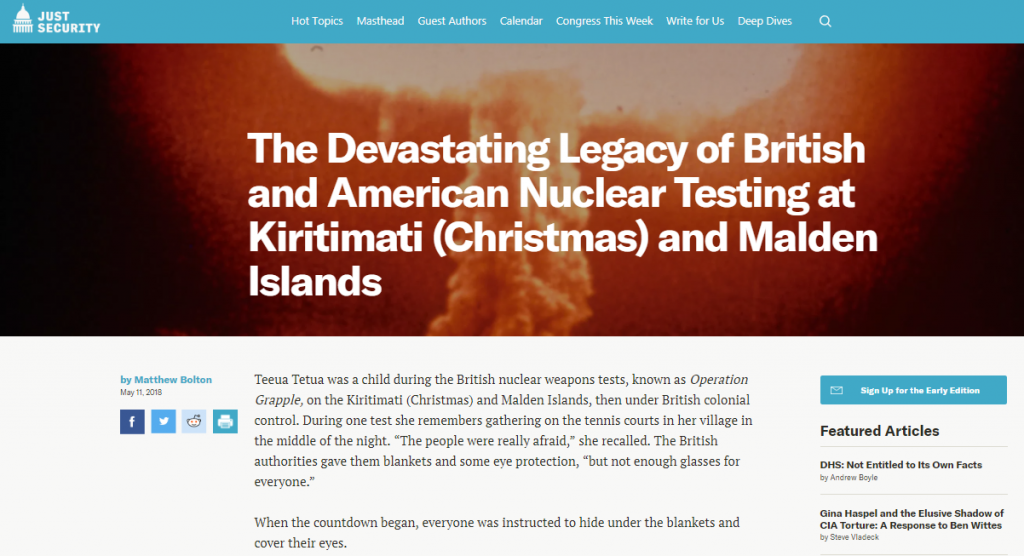Just Security ran an article 11 May 2018 covering reports by Pace University’s International Disarmament Institute (one on Kiribati and the other on Fiji) on the humanitarian, human rights and environmental impacts of UK and US nuclear weapons testing in what is now the Republic of Kiribati:
“In addition to the some 500 indigenous I-Kiribati people on Kiritimati island, now part of the Republic of Kiribati, 43,000 military and civilian personnel from the United Kingdom, New Zealand, the United States and Fiji participated in the total of 33 U.K. and U.S. nuclear weapons tests in and around Kiribati between 1957 and 1962. …
“In 2015, Kiribati’s permanent representative to the UN, Ambassador Makurita Baaro stated, “Today, our communities still suffer from the long-term impacts of the tests, experiencing higher rates of cancer, particularly thyroid cancer, due to exposure to radiation. …
“There has never been a sufficiently comprehensive, public, and independent analysis of the environmental impact of nuclear testing at Kiritimati, nor Malden Island. … Nevertheless, there is extensive evidence that the tests killed and maimed wildlife and damaged vegetation. …
“The 2017 Treaty on the Prohibition of Nuclear Weapons (TPNW) frames nuclear weapons as an affront to humanity and acknowledges the humanitarian and environmental harm of use and testing, including the disproportionate impact on women and girls and indigenous peoples. In addition to banning nuclear weapons, the TPNW obliges states that join it to address the harm inflicted on people and the environment from nuclear weapons use and testing.”
To read the whole article, click here.
For the International Disarmament Institute’s comprehensive report on the impact of the Kiritimati and Malden Island nuclear weapons tests, click here. For its report on the impact on Fijian veterans, click here.
For the International Disarmament Institute’s general overview of the global humanitarian, human rights and environmental impact of nuclear weapons use and testing, click here.


November 4, 2022 at 1:20 pm
I read this Pace Report with great interest having represented t UK Nuclear Tests Veterans and argued their cases before the European Commission and Court of Human Rights at Strasbourg, including those of Fijian troops. I also represented and argued on behalf of Christmas Islanders irradiated during Grapple Y before the EU Parliament’s Petitions Committee.
As a result I have considerable detailed documentation on these issues which the Report’s compilers might find interesting. I am currently in Scotland at the moment but will be returning to NYC later this month.
The Report was referred to in a BBC 4 radio program on “Living in the Shadow of the Bomb”.
Keep up the good work,
Ian Anderson.